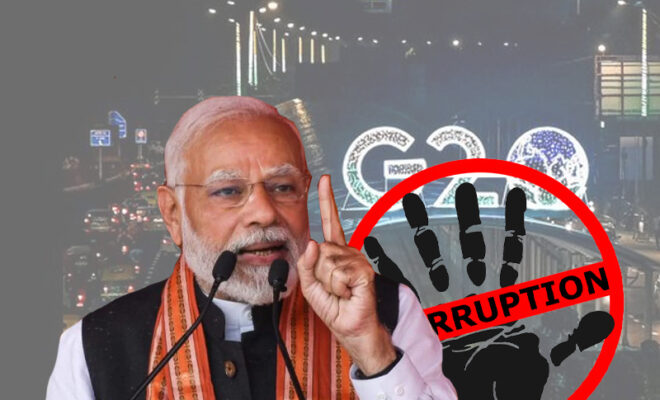India Emphasizes Strict Policy Against Corruption At G20 Meeting

Indian Prime Minister Narendra Modi emphasized India’s strong stance against corruption during the G20 Anti-Corruption Ministerial Meeting.
He mentioned that India has a zero-tolerance policy towards corruption and is using technology and e-governance to promote transparency and accountability.
Modi referred to the writings of Tagore and ancient Indian Upanishads, highlighting the importance of avoiding greed.
He pointed out that corruption primarily affects marginalized communities and leads to improper resource utilization, market distortions, and poor service delivery, ultimately reducing people’s quality of life. He stressed the government’s responsibility to combat corruption and its detrimental effects.
Modi also highlighted various measures India has taken to counter corruption, including the Economic Offenders Act enacted in 2018, which targets economic offenders and fugitives.
He mentioned the recovery of assets worth over 1.8 billion dollars from these individuals. He also discussed the Prevention of Money Laundering Act (PMLA), which has helped attach assets worth more than USD 12 billion since 2014.
Modi pointed out initiatives such as direct benefit transfers to bank accounts, which have benefited hundreds of millions of people in India, and the government e-Marketplace (GeM) portal, which enhances transparency in government procurement.
The G20 Anti-Corruption Working Group, held under India’s presidency, is addressing global corruption issues. The meeting involves representatives from G20 member nations, 10 invitee countries, and international organizations.
The discussions include innovative approaches to combat corruption, share best practices, and strengthen international cooperation.
The event in Kolkata culminates in the G20 Anti-Corruption Ministerial Meeting, chaired by Union Minister Jitendra Singh. This meeting is providing a platform for high-level dialogues, strategic insights, and policy recommendations regarding anti-corruption efforts.
The G20 Anti-Corruption Working Group was formed to provide anti-corruption advice to G20 leaders. Its members include G20 countries, the European Union, and other guest countries.
The group collaborates with international organizations and focuses on themes like public and private sector integrity, bribery, asset recovery, and capacity-building.
ALSO READ: How Many Bills Did India Successfully Pass In This Monsoon Session?
India has also highlighted measures like the Economic Offenders Act and the Prevention of Money Laundering Act, and discussed initiatives to enhance transparency at the G20 Anti-Corruption Ministerial Meeting.
This international meeting has a vision to address global corruption issues. The collaboration of 20 countries will promote international cooperation in fighting corruption in their respective countries too.



